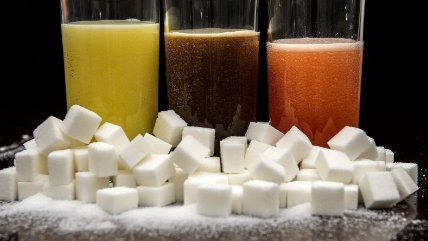Drafter of U.S. Dietary Goals Was Bribed by Big Sugar to Demonize Fat
Newly released historical documents show the Sugar Research Foundation paid scientists to blame fat and cholesterol, not sugar, for coronary heart disease.


Newly released historical documents show how the sugar industry essentially bribed Harvard scientists to downplay sugar's role in heart disease—and how the U.S. government ate it up.
The link between a high-sugar diet and the development of metabolic problems had begun emerging in the 1950s. In 1965, a group called the Sugar Research Foundation (SRF) funded a study assessing previous studies on this possibility. That literature review, published in the prestigious New England Journal of Medicine in 1967, concluded that fat and cholesterol were the real culprits when it came to coronary heart disease.
"The SRF set the review's objective, contributed articles for inclusion, and received drafts," according to a new paper published in JAMA Internal Medicine "The SRF's funding and role was not disclosed."
The New York Times wants this to be a story about junk-food bigwigs screwing with science to the detriment of American health. And it is, in part. But beyond that, the findings also indict "dietary science" that the U.S. government has been pushing for decades, and still continues to push.
As we know now, high cholesterol levels in the blood may portend heart problems, but consuming high-cholesterol food—such as eggs, long demonized as a heart-health no-no—doesn't correlate to high blood-cholesterol. And saturated fats come in many forms, some bad for you and others some of the healthiest things you can consume.
But for decades, conventional wisdom in America said that dietary fats and cholesterol were to be extremely rare in a nutritious diet. Meanwhile, sugar got a rep for rotting your teeth (and maybe packing on a few pounds) but was otherwise considered benign. And this demonization of fat actually helped increase U.S. sugar consumption, as health conscious Americans replaced morning eggs and sausage with carbs like bagels, or turned to low-fat and fat-free offerings where added sugar helped fill the taste void.
How did Big Sugar pull this off?
With a little help from Harvard scientists, for starters. SRF—now called the Sugar Association—paid three of them the equivalent of $49,000 in today's dollars to publish the misleading literature review. One of these scientists, the late D. Mark Hegsted, went on to become a major driver of U.S. dietary advice.
In the early '60s, Hegsted had developed what came to be known as the "Hegsted equation," which allegedly showed how saturated fats in eggs and meat raise blood cholesterol. A few years after he was paid by the sugar industry to demonize fat and cholesterol, he was elected to the National Academy of Sciences and edited its Nutrition Reviews for a decade.
Hegsted would also go on to help the U.S. Department of Agriculture (USDA) draft its first "Dietary Goals for the United States," a 1977-precursor to today's federal Dietary Guidelines for Americans, and to be hired by the agency as the head of its nutrition division, a position he held from 1978-1982.
"Even though the influence-peddling revealed in the documents dates back nearly 50 years, more recent reports show that the food industry has continued to influence nutrition science," the Times notes. That's also true. What the Times doesn't say, however, is how much the food industry continues to influence federal food policy and advice even independent of any shady research.
At the 2015 National Food Policy Conference, a two-day affair I attended in downtown D.C., food-industry associates gave talks alongside federal officials and their logos— Nestlé, Dannon, Cargill—were splashed everywhere. The food industry has and continues to influence nutrition "knowledge" because federal agencies encourage it.
A report published last fall found that government nutrition rules have been and are still based more on money and politics than sound science. The latest update to federal dietary guidelines still cautions against saturated fat and sodium. Members of the committee that developed these guidelines have accepted funding from industry groups, such as the Tree Nut Council, and food companies such as Unilever. (Last fall also brought revelations of some questionable connections between Unilever, the American Egg Board, and the U.S. Food and Drug Administration in a bizarre plot to take down vegan mayonnaise).
Funding good nutrition research is expensive, and we shouldn't automatically look at industry-funded studies or researchers who accept food-industry funding as suspect. But let's not pretend like this sugar scandal is simply a relic of the bad old days of non-disclosure and undue influence. There continues to be every bit as much reason to look skeptically at government dietary advice today as there was in the 20th Century.
